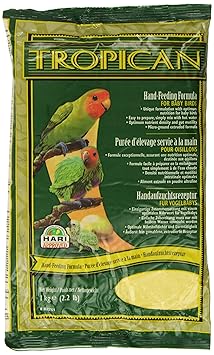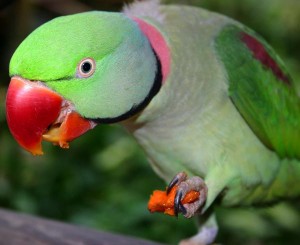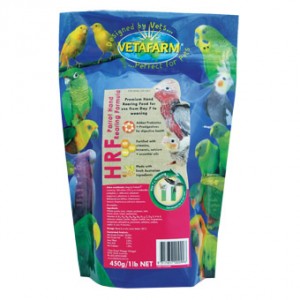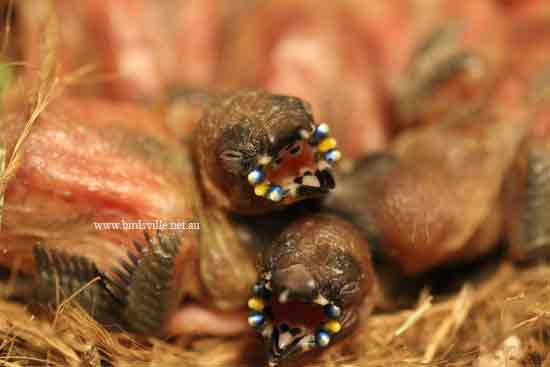
Hand Raising Baby Birds
Hand Raising Baby Birds is a wonderful experience for bird lovers. Whatever the reason, for love or necessity, when you decide to hand raise a baby bird it is a responsibility, however it is very rewarding. Perhaps you have found a Dove on the foot path, a finch or budgie from a fall, or an orphaned bird? Or maybe you may find a bird discarded by it’s parents in the home aviary, or you want to bond with a pet bird? A non hand raised bird can be tamed to a degree with many hours of handling and training, but they will never love you the way a hand Zupreem Hand raised bird will. It is truly a wonderful experience to hand raise a baby bird – the young bird will see you as their own kind, their parent perhaps?
Risks and proplems in hand raising a baby parrot
The biggest risk is that your bird could die. If your baby bird is not hand raised properly or correctly or has a preexisting or genetic condition, then the chances are your baby bird will not survive so hand raising is not for everyone.
Many people arrive to our store that have purchased a baby bird online for a cheap price and the bird is close to death. Sadly, most of the time these birds are very close to passing away simply because the new owner did not hand raise the bird properly and the seller has sold to someone who does not know what they are doing. One of the ways sadly pets are paying the price for the online sales of livestock.
another issue is homemade formulas many breeders feed baby birds which causes rickets in young birds which is a vitamin and mineral deficiency.
Make sure you do your research before purchasing a baby un weaned bird. FYI we do not sell birds unless they are fully weaned.
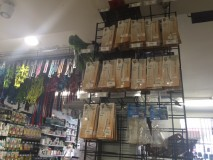
What Age to Start Hand Raising Baby Birds?
There are 2 methods of hand raising baby birds. The first is right from the egg, the second is rearing them from 2 or 3 weeks of age. At Birdsville we hand raise our birds from 2 or 3 weeks old for a number of reasons. A bird egg that has been incubated and raised by humans from the moment of hatching does not receive any of the good bacteria from the parent birds, which effects the bird’s ability to fight disease/bacteria. We have found hand raising baby birds right from the egg do not reach the maximum size of a bird that has had a chance to receive the good bacteria from the parental bird.
We recommend hand raising your bird from around 2 or 3 weeks of age especially for beginners. Please note: If the bird is too old, they can still be quite wild and difficult to hand raise this is why birds are hand raised from a certain age.
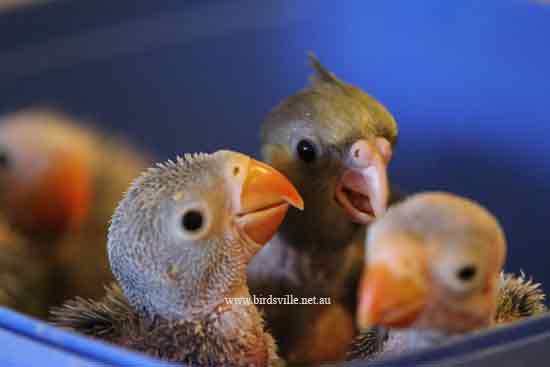
Correct Environment for Hand Raising Baby Birds
Do not place a baby bird that has not fledged into a bird cage this happens more often due to the amount of birds these days sold online to people who have no idea!
All the time people see our parrot’s walking around at Birdsville and then they see a container with some baby parrot’s Huddled in a container and ask are they ok? isn’t that cruel having those birds in a box when the others are all walking around? The fact is all parrots in the wild naturally start life inside a cramped musty log hollow and that is how they like it. Why? Unlike chickens and ducklings that hatch with eye’s open and are able to walk almost immediately, parrots, dove’s and finches are all altricial which means they hatch with the eyes closed with little or not down and take a long time to develop. These birds to not usually leave the nest until they are almost the same size as the parent birds. So it is natural for them to just huddle in the corner just waiting for the day they will begin to venture outside the nest box or for a hand raised bird, the brooder or container they are kept in.
Substrate – A good friend of mine from another Bird shop who has been hand raising birds longer than I’ve been alive, taught me the most valuable thing I ever learnt when hand raising baby parrot’s and that was to place them in chick starter. This surprised me but makes perfect sense. I had used towels, but this caused problems with their legs and feet which is a potential hazard, tissues which had a similar problem because when a young birds’ legs splay, they are very difficult to fix. Saw dust is an answer to this problem but has a different and real hazard that the young birds can eat the shavings, and this can make them sick. Till this day the only substrate I would recommend placing in the bottom of the box when hand raising is either chick starter or turkey crumble. If they eat this it not only doesn’t harm them, but it helps with the weaning process, and they just receive a little extra protein.
Brooders are ideal if you plan on hand raising many parrots but is reasonably expensive to purchase and not necessary for someone who is only raising a clutch or one baby. Any plastic container is fine or even a cardboard box try not to place them in anything glass as this can be a bit cold.
An ambient temperature of 30 to 35 degree Celsius for day old chicks and reduce temperature by 1 or 2 degrees a day. For heat use heat coils, heat pads or even a heat lamp. I’ve had great success just using your average light globe but be very careful not to overheat the babies or let anything catch on fire. If you see the babies panting reduce the heat immediately.
What to Feed Baby Birds
There are many different hand rearing formulas commercially available some. For example: When hand rearing Galah’s, White Cockies, Major Mitchells, Budgies, Doves, Finches, Cockatiels and other granivores I have found using Passwell Hand Rearing Formula and Wombaroo Granivore works really well.
There is many different brands of lorikeet formula, Birdsville stocks a variety of quality food formulas at wholesale prices, be wary of many supermarket or “homemade” mixes of food as feeding a low-quality mix, can cause rickets in young birds which is a common issue in baby birds that can be simply avoided by feeding a quality formula. If unsure of what your buying, ask your local bird small animal specialist store.
For fruit eating parrots such as Eclectus, Amazon’s, Green Cheek Conure’s, Caique’s, Macaw’s I have had great success using Passwell Hand Rearing Formula, Wombaroo Granivore, Tropican hand rearing formula, Zupreem Hand Rearng formula, Vetafarm Hand Rearing Formula and Vetafarm Neocare,
Hand raising Lorikeets we recommend using any of the above formulas mixed 50/50 with any good quality lorikeet food such as Shep’s Wet or Wombaroo Lorikeet, passwell Lorikeet formula, vetafarm forest fusion, avione lorikeet food, for more info on Young Lorikeets see Lorikeet Care Sheet
Rule Number One
When giving hand raising formula make sure it contains probotics. This is due to the hand rearing formulas passing through the crop faster than food fed to baby birds by parental birds, which they can lose some of the good bacteria and this just keeps your birds strong from the inside out. Many formula’s that contain probotic supplements are available or can be purchase separately.
Some people have used homemade diets to feed baby birds these should be critically assessed for the nutritional value and suitability for young birds as this can affect the development of the bird and long-term health and immune system. We do see a lot of baby birds with metabolic bone disease or low immune function, and this could have started from a nutrient deficiency in the hand rearing formula.
Feeding Chicks
- Always feed them warm formula but be careful not to burn the baby birds crop as it will die. Do not microwave food this can create hot pockets in the formula.
- Only mix enough food for one feed at a time.
- Never feed a bird with feed still in the crop as this will cause the old food to curdle and will probably kill the baby bird if there is food in the crop (which is the sac under the birds head) wait until it is completely empty.
- Do not fill the crop until it is bulging and very full as this can stretch the crop.
- Always mix food according to manufacturer’s directions.
- Hygiene is essential always disinfect all feeding instruments and dishes.
- Feed baby birds using a syringe, crop needle or a specialized spoon.
- Always be gentle if using a crop needle.
When feeding with a syringe or spoon, only feed when the bird is begging, which is when the bird’s head is bobbing up and down.
Guide for Feeding intervals
The older the bird is the longer they can go without needing to be fed. This is a rough guide for most parrots, but this may vary depending on species.
- 1-7 days old will need hourly feeds 24 hours a day.
- 7-14 days old will need a feed every 2 hours with around a 5-hour break at night.
- 14-21 days old feed every 3 to 4 hours with a 6-hour break at night
- 21-28 days old feed every 4 to 5 hours a day with a 7-hour break at night
- 28 to 42 days feed every 5 to 6 hours.
- by week 8 every 8 hours
- when your bird is starting to eat fruit seed and pellets just feed morning and night and only stop when your bird no longer wants to eat hand rearing formula as some birds take longer to wean than others.
Signs of Illness when Hand Raising Baby Birds
If your inexperienced with birds always weight and examine your bird. Baby and young birds are very susceptible to bacterial infections.
Sign of illness include, but not limited to:
- Lethargic not willing to feed.
- Not gaining weight or putting weight on
- Skin changes to red or white
- Skin more wrongly than normal – this is dehydration.
- Vomiting
- Change in droppings.
- Crop emptying slowly.
Hand rearing Parrots requires dedication as these animals are very delicate.
Commercially Available Hand Rearing Formulas
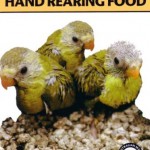
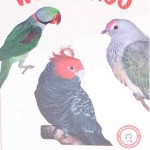
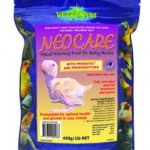
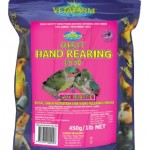
page under construction, add what to use for finches to macaws
